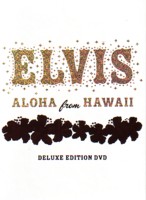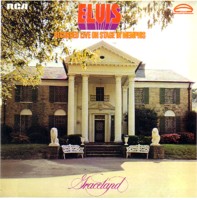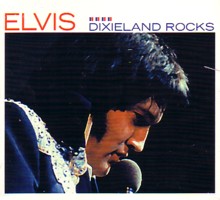Elvis
continues to ‘sell out’ even after death
By
DAVID SEGAL, The Washington Post Published: Friday, Dec. 31,
2004
It’s
been two weeks since Elvis Presley was acquired in a cash
and stock deal valued at $100 million, and still hardly anyone
seems to have noticed, let alone gotten worked up about it.
There were the obligatory mentions in the business pages.
There were groans in the visitor forums of some Elvis Web
sites - “the seven deadly sins come to mind,” sniped one fan.
But not much more.
Sort
of surprising, isn’t it? We’re talking about ownership of
the pre-eminent icon of American pop culture, and like any
icon, this one is in some important way our creation.
A
businessman named Robert Sillerman, who made a fortune buying
and selling radio stations and concert venues, now owns the
King and he’s going to sell him - or his likeness, anyway
- in markets he calls “under-Elvised.”
That
means cities like Las Vegas and countries like Japan where,
he said in interviews, images of Presley are surprisingly
hard to find. Sillerman has gobs to invest in all sorts of
ventures, and he could slap Elvis on mugs, T-shirts and souvenir
mini-bowling balls from here to Okinawa. Lots of Presley partisans
will salute this international product rollout, and anything
else that raises the profile of their hero.
But
that alone won’t explain the silence that greeted the size
of the King’s ransom.
No,
to understand that you need to know this: Elvis is the greatest
sellout in American history. Not just in the history of rock
’n’ roll, mind you. He’s the greatest sellout, period. You’d
be hard pressed to find someone who sold out more, sold out
earlier, sold out with greater regularity.
Elvis
started selling out almost as soon as he caught on, and he
didn’t stop until - well, he never stopped actually. Which
is why the Sillerman purchase never raised anyone’s dander.
It makes perfect sense in the context of Elvis’s entire life.
Actually, it makes perfect sense in the context of American
history.
We’ve
always been a little ambivalent about selling out; we do it
more often and more grandly than any nation on Earth. The
first recorded use of the phrase, according to the Oxford
English Dictionary, referred to “the proposed sell-out of
the State of North Dakota to the infamous Louisiana Lottery
Company.”
We
can only imagine what that must have been about. The year
was 1890. The classic sellout, of course, involves trading
your ideals for money, which Presley did. He was a celestial,
once-in-a-century talent. Nonetheless, he ended up squandering
his gifts singing cheesy bossa novas, acting in lousy movies
and taking the easy money.
While
Presley was occasionally disgusted by the dreck he was asked
to sing in the studio, and while he resented hack scripts
like “Harum Scarum,” perhaps the worst of his many movies,
he was never bothered enough to make a fuss, at least not
a fuss that would improve his material. If your only goal
is to sell, quality be damned, you have lots to sell and nothing
to sell out. That’s an ethos with legs, as it happens.
If
you want to understand Snoop Dogg or 50 Cent or any number
of rap stars, you need to understand Elvis. Those guys owe
the man. Before we get to why, let’s be clear that Elvis can’t
be entirely blamed - or credited, if you prefer - with his
innumerable sellouts. Elvis was needled and psychologically
badgered into nearly every deal that shaped his professional
life by his manager, Col. Tom Parker.
A
former carny whose quick-money philosophy shadowed every dotted
line that Elvis signed, Parker was notorious for two-bit schemes.
He once charged admission to see a horse, billed as the world’s
smallest, that was actually just a pony, buried up to his
knees. But leave that aside. At the time that Elvis started
selling out the idea of a rock star selling out didn’t exist.
Rock then was just a type of music that was huge with the
kids.
The
expectation was that something else would replace it, soon.
Only later, when it was clear that rock wasn’t going away
- when it took on the spiritual significance of a religion
- was the idea of “selling out” your rock ’n’ roll roots even
possible. By the mid-’60s, Elvis was basically a spectator
at the revolution in pop. He spent most of his studio time
on easy-listening soundtrack albums for a series of increasingly
crummy films. He just couldn’t turn down a big check, even
if some of those decisions were stupendously ill-advised.
In
1973, when they both were in need of a cash infusion, Elvis
and Col. Parker sold to RCA the artist’s royalty rights to
all of Presley’s back catalogue, for a measly $5 million.
But for that notorious deal, the price tag on Elvis Presley
Enterprises, which is the entity that Sillerman recently bought
85 percent of, would have been many times larger. “Elvis died
when he went into the Army,” John Lennon said when Presley
actually expired in 1977. It’s a sentiment you’ll hear from
more than a few of his early and ardent fans. But the critics
have always been outnumbered by the admirers.
“A
handful of people wrote e-mails saying the sky is falling
when the (Sillerman) deal was announced,” Jack Soden, the
CEO of Elvis Presley Enterprises, said Tuesday. “But a significant
majority understand that this is a good thing. That this will
allow the legacy of Elvis to grow and prosper.”
Presley
was rock music’s first franchise, and today he’s as close
to a one-man Wal-Mart as any artist will ever get. This is
his legacy to today’s performers.
Take
Snoop Dogg. Right now, according to Rolling Stone magazine,
the Dogg is getting paid by T-Mobile (for an ad) and Vital
Toys (for an action figure), and XM Satellite Radio (for a
monthly show), and Pony Sneakers (for the Doggy Biscuitz shoe
line), by the makers of VSOP Passion Blend, a booze, and by
the naughty lads behind “Girls Gone Wild” videos, who license
his name for a “Doggy Style” line of tapes. You hear anyone
calling Snoop a sellout? Nah.
Songs
beget films, films beget endorsements and endorsements beget
more songs. It’s the great shameless cycle of American commerce,
and proof, if any were needed, that the King is gone but he’s
not forgotten.
|





